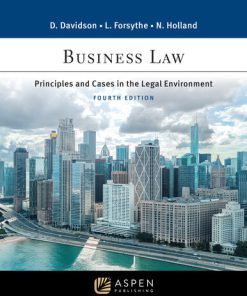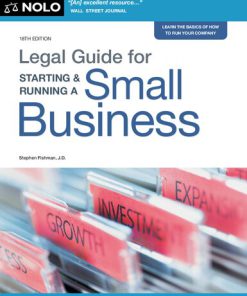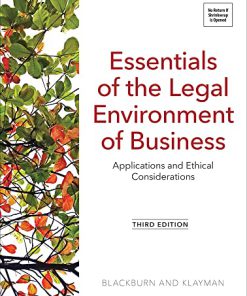Business Law The Ethical Global and Digital Environment 18th Edition by Jamie Darin Prenkert, A James Barnes, Joshua Perry, Todd Haugh, Abbey Stemler ISBN 9781260736892 126073689X
$50.00 Original price was: $50.00.$25.00Current price is: $25.00.
Business Law The Ethical Global and Digital Environment 18th Edition by Jamie Darin Prenkert, A James Barnes, Joshua Perry, Todd Haugh, Abbey Stemler – Ebook PDF Instant Download/Delivery: 9781260736892 ,126073689X
Full download Business Law The Ethical Global and Digital Environment 18th Edition after payment

Product details:
ISBN 10: 126073689X
ISBN 13: 9781260736892
Author: Jamie Darin Prenkert, A James Barnes, Joshua Perry, Todd Haugh, Abbey Stemler
Business Law The Ethical Global and Digital Environment 18th Edition Table of contents:
Part 1 Foundations of American Law
1 The Nature of Law
Types and Classifications of Law
The Types of Law
Priority Rules
Classifications of Law
Jurisprudence
Legal Positivism
Natural Law
American Legal Realism
Sociological Jurisprudence
Other Schools of Jurisprudence
The Functions of Law
Legal Reasoning
Case Law Reasoning
Statutory Interpretation
Limits on the Power of Courts
Appendix Reading and Briefing Cases
2 The Resolution of Private Disputes
State Courts and Their Jurisdiction
Courts of Limited Jurisdiction
Trial Courts
Appellate Courts
Jurisdiction and Venue
Federal Courts and Their Jurisdiction
Federal District Courts
Specialized Federal Courts
Federal Courts of Appeals
The U.S. Supreme Court
Civil Procedure
Service of the Summons
The Pleadings
Motion to Dismiss
Discovery
Summary Judgment
The Pretrial Conference
The Trial
Appeal
Enforcing a Judgment
Class Actions
Alternative Dispute Resolution
Common Forms of ADR
Other ADR Devices
3 Business and the Constitution
An Overview of the U.S. Constitution
The Evolution of the Constitution and the Role of the Supreme Court
The Coverage and Structure of This Chapter
State and Federal Power to Regulate
State Regulatory Power
Federal Regulatory Power
Burden on, or Discrimination against, Interstate Commerce
Independent Checks on the Federal Government and the States
Incorporation
Government Action
Means-Ends Tests
Business and the First Amendment
Due Process
Equal Protection
Independent Checks Applying Only to the States
The Contract Clause
Federal Preemption
The Takings Clause
4 Business Ethics, Corporate Social Responsibility, Corporate Governance, and Critical Thinking
Why Study Business Ethics?
The Corporate Social Responsibility Debate
Ethical Theories
Rights Theory
Justice Theory
Utilitarianism
Shareholder Theory
Virtue Theory
Improving Corporate Governance and Corporate Social Responsibility
Independent Boards of Directors
The Law
Guidelines for Ethical Decision Making
What Facts Impact My Decision?
What Are the Alternatives?
Who Are the Stakeholders?
How Do the Alternatives Impact Society as a Whole?
How Do the Alternatives Impact My Business Firm?
How Do the Alternatives Impact Me, the Decision Maker?
What Are the Ethics of Each Alternative?
What Are the Practical Constraints of Each Alternative?
What Course of Action Should Be Taken and How Do We Implement It?
Knowing When to Use the Guidelines
Thinking Critically
Non Sequiturs
Appeals to Pity
False Analogies
Begging the Question
Argumentum ad Populum
Bandwagon Fallacy
Argumentum ad Baculum
Argumentum ad Hominem
Argument from Authority
False Cause
The Gambler’s Fallacy
Reductio ad Absurdum
Appeals to Tradition
The Lure of the New
Sunk Cost Fallacy
Common Characteristics of Poor Decision Making
Failing to Remember Goals
Overconfidence
Complexity of the Issues
Resisting Requests to Act Unethically
Recognizing Unethical Requests and Bosses
Buying Time
Find a Mentor and a Peer Support Group
Find Win—Win Solutions
Work within the Firm to Stop the Unethical Act
Prepare to Lose Your Job
Leading Ethically
Be Ethical
Communicate the Firm’s Core Ethical Values
Connect Ethical Behavior with the Firm’s and Workers’ Best Interests
Reinforce Ethical Behavior
Part 2 Crimes and Torts
5 Criminal Law and Procedure
Role of the Criminal Law
Nature of Crimes
Purpose of the Criminal Sanction
Essentials of Crime
Constitutional Limitations on Power to Criminalize Behavior
Criminal Procedure
Criminal Prosecutions: An Overview
Role of Constitutional Safeguards
The Fourth Amendment
Key Fourth Amendment Questions
Warrantless Searches and the Fourth Amendment
The Fifth Amendment
The Sixth Amendment
White-Collar Crimes and the Dilemmas of Corporate Control
Introduction
Evolution of Corporate Criminal Liability
Corporate Criminal Liability Today
Individual Liability for Corporate Crime
New Directions
Important White-Collar Crimes
Regulatory Offenses
Fraudulent Acts
The Sarbanes—Oxley Act
Bribery and Giving of Illegal Gratuities
Computer Crime
6 Intentional Torts
Interference with Personal Rights
Battery
Assault
Intentional Infliction of Emotional Distress
False Imprisonment
Defamation
Invasion of Privacy
Misuse of Legal Proceedings
Deceit (Fraud)
Interference with Property Rights
Trespass to Land
Private Nuisance
Conversion
Other Examples of Intentional Tort Liability
7 Negligence and Strict Liability
Negligence
Duty and Breach of Duty
Causation of Injury
Res Ipsa Loquitur
Negligence Defenses
Strict Liability
Abnormally Dangerous Activities
Statutory Strict Liability
Tort Reform
8 Intellectual Property and Unfair Competition
Protection of Intellectual Property
Patents
Copyrights
Trademarks
Trade Secrets
Definition of a Trade Secret
Ownership and Transfer of Trade Secrets
Misappropriation of Trade Secrets
Commercial Torts
Injurious Falsehood
Interference with Contractual Relations
Interference with Prospective Advantage
Lanham Act § 43(a)
Part 3 Contracts
9 Introduction to Contracts
The Nature of Contracts
The Functions of Contracts
The Evolution of Contract Law
The Methods of Contracting
Basic Elements of a Contract
Basic Contract Concepts and Types
Bilateral and Unilateral Contracts
Valid, Unenforceable, Voidable, and Void Contracts
Express and Implied Contracts
Executed and Executory Contracts
Sources of Law Governing Contracts
The Uniform Commercial Code: Origin and Purposes
Application of Article 2
Application of the Common Law of Contracts
Law Governing “Hybrid” Contracts
Relationship of the UCC and the Common Law of Contracts
Basic Differences in the Nature of Article 2 and the Common Law of Contracts
Influence of Restatement (Second) of Contracts
“Noncontract” Obligations
Quasi-Contract
Promissory Estoppel
10 The Agreement: Offer
Requirements for an Offer
Intent to Contract
Definiteness of Terms
Communication to Offeree
Special Offer Problem Areas
Advertisements
Rewards
Auctions
Bids
Which Terms Are Included in the Offer?
Termination of Offers
Terms of the Offer
Lapse of Time
Revocation
Rejection
Death or Mental Incapacity of Either Party
Destruction of Subject Matter
Intervening Illegality
11 The Agreement: Acceptance
What Is an Acceptance?
Intention to Accept
Intent and Acceptance on the Offeror’s Terms
Communication of Acceptance
When Is Acceptance Communicated?
Acceptances by Instantaneous Forms of Communication
Acceptances by Noninstantaneous Forms of Communication
Stipulated Means of Communication
Special Acceptance Problem Areas
Acceptance in Unilateral Contracts
Acceptance in Bilateral Contracts
Silence as Acceptance
Acceptance When a Writing Is Anticipated
Acceptance of Ambiguous Offers
Who Can Accept an Offer?
12 Consideration
Elements of Consideration
Legal Value
Bargained-For Exchange
Exchanges That Fail to Meet Consideration Requirements
Illusory Promises
Preexisting Duties
Past Consideration
Exceptions to the Consideration Requirement
Promissory Estoppel
Promises to Pay Debts Barred by Statutes of Limitations
Promises to Pay Debts Barred by Bankruptcy Discharge
Charitable Subscriptions
13 Reality of Consent
Effect of Doctrines Discussed in This Chapter
Necessity for Prompt and Unequivocal Rescission
Misrepresentation and Fraud
Relationship between Misrepresentation and Fraud
Requirements for Rescission on the Ground of Misrepresentation
Mistake
Nature of Mistake
Requirements for Mutual Mistake
Requirements for Unilateral Mistake
Duress
Nature of Duress
Requirements for Duress
Economic Duress
Undue Influence
Nature of Undue Influence
Determining Undue Influence
14 Capacity to Contract
What Is Capacity?
Effect of Lack of Capacity
Capacity of Minors
Minors’ Right to Disaffirm
Period of Minority
Emancipation
Time of Disaffirmance
Ratification
Duties upon Disaffirmance
Effect of Misrepresentation of Age
Capacity of Mentally Impaired Persons
Theory of Incapacity
Test for Mental Incapacity
The Effect of Incapacity Caused by Mental Impairment
Contracts of Intoxicated Persons
Intoxication and Capacity
15 Illegality
Meaning of Illegality
Determining Whether an Agreement Is Illegal
Agreements in Violation of Statute
Agreements Declared Illegal by Statute
Agreements That Violate the Public Policy of a Statute
Agreements That May Be in Violation of Public Policy Articulated by Courts
Agreements in Restraint of Competition
Exculpatory Clauses
Family Relationships and Public Policy
Unfairness in Agreements: Contracts of Adhesion and Unconscionable Contracts
Unconscionability
Contracts of Adhesion
Effect of Illegality
General Rule: No Remedy for Breach of Illegal Agreements
Exceptions
16 Writing
The Significance of Writing in Contract Law
Purposes of Writing
Writing and Contract Enforcement
Overview of the Statute of Frauds
History and Purposes
Effect of Violating the Statute of Frauds
Contracts Covered by the Statute of Frauds
Collateral Contracts
Interest in Land
Contracts That Cannot Be Performed within One Year
Promise of Executor or Administrator to Pay a Decedent’s Debt Personally
Contract in Which Marriage Is the Consideration
Meeting the Requirements of the Statute of Frauds
Nature of the Writing Required
UCC: Alternative Means of Satisfying the Statute of Frauds in Sale of Goods Contracts
Promissory Estoppel and the Statute of Frauds
The Parol Evidence Rule
Explanation of the Rule
Scope of the Parol Evidence Rule
Admissible Parol Evidence
Interpretation of Contracts
17 Rights of Third Parties
Assignment of Contracts
Nature of Assignment of Rights
Creating an Assignment
Assignability of Rights
Nature of Assignee’s Rights
Subsequent Assignments
Successive Assignments
Assignor’s Warranty Liability to Assignee
Delegation of Duties
Nature of Delegation
Delegable Duties
Language Creating a Delegation
Assumption of Duties by Delegatee
Discharge of Delegator by Novation
Third-Party Beneficiaries
Intended Beneficiaries versus Incidental Beneficiaries
Vesting of Beneficiary’s Rights
18 Performance and Remedies
Conditions
Nature of Conditions
Types of Conditions
Creation of Express Conditions
Excuse of Conditions
Performance of Contracts
Level of Performance Expected of the Promisor
Good-Faith Performance
Breach of Contract
Effect of Material Breach
Determining the Materiality of the Breach
Anticipatory Repudiation
Recovery by a Party Who Has Committed Material Breach
Excuses for Nonperformance
Impossibility
Commercial Impracticability
Other Grounds for Discharge
Discharge by Mutual Agreement
Discharge by Accord and Satisfaction
Discharge by Waiver
Discharge by Alteration
Discharge by Statute of Limitations
Discharge by Decree of Bankruptcy
Remedies for Breach of Contract
Types of Contract Remedies
Interests Protected by Contract Remedies
Legal Remedies (Damages)
Equitable Remedies
Part 4 Sales
19 Formation and Terms of Sales Contracts
Sale of Goods
Leases
Higher Standards for Merchants
UCC Requirements
Terms of Sales Contracts
Gap Fillers
Price Terms
Quantity Terms
Output and Needs Contracts
Exclusive Dealing Contracts
Time for Performance
Delivery Terms
Title
UCC Changes
General Title Rule
Title and Third Parties
Obtaining Good Title
Transfers of Voidable Title
Buyers in the Ordinary Course of Business
Entrusting of Goods
Risk of Loss
Terms of the Agreement
Shipment Contracts
Destination Contracts
Goods in the Possession of Third Parties
Risk Generally
Effect of Breach on Risk of Loss
Insurable Interest
Sales on Trial
Sale or Return
Sale on Approval
20 Product Liability
The Evolution of Product Liability Law
The 19th Century
The 20th and 21st Centuries
The Current Debate over Product Liability Law
Theories of Product Liability Recovery
Express Warranty
Implied Warranty of Merchantability
Implied Warranty of Fitness
Negligence
Strict Liability
The Restatement (Third)
Other Theories of Recovery
Time Limitations
Damages in Product Liability Cases
The No-Privity Defense
Tort Cases
Warranty Cases
Disclaimers and Remedy Limitations
Implied Warranty Disclaimers
Express Warranty Disclaimers
Disclaimers of Tort Liability
Limitation of Remedies
Defenses
The Traditional Defenses
Comparative Principles
Preemption and Regulatory Compliance
21 Performance of Sales Contracts
General Rules
Good Faith
Course of Dealing
Usage of Trade
Modification
Waiver
Assignment
Delivery
Basic Obligation
Place of Delivery
Seller’s Duty of Delivery
Inspection and Payment
Buyer’s Right of Inspection
Payment
Acceptance, Revocation, and Rejection
Acceptance
Effect of Acceptance
Revocation of Acceptance
Buyer’s Rights on Improper Delivery
Rejection
Right to Cure
Buyer’s Duties after Rejection
Assurance, Repudiation, and Excuse
Assurance
Anticipatory Repudiation
Excuse
22 Remedies for Breach of Sales Contracts
Agreements as to Remedies
Statute of Limitations
Seller’s Remedies
Remedies Available to an Injured Seller
Cancellation and Withholding of Delivery
Resale of Goods
Recovery of the Purchase Price
Damages for Rejection or Repudiation
Seller’s Remedies Where Buyer Is Insolvent
Seller’s Right to Stop Delivery
Liquidated Damages
Buyer’s Remedies
Buyer’s Remedies in General
Buyer’s Right to Damages
Buyer’s Right to Cover
Incidental Damages
Consequential Damages
Damages for Nondelivery
Damages for Defective Goods
Buyer’s Right to Specific Performance
Buyer and Seller Agreements as to Remedies
Part 5 Property
23 Personal Property and Bailments
Nature of Property
Classifications of Property
Personal Property versus Real Property
Tangible versus Intangible Personal Property
Public and Private Property
Acquiring Ownership of Personal Property
Production or Purchase
Possession of Unowned Property
Rights of Finders of Lost, Mislaid, and Abandoned Property
Legal Responsibilities of Finders
Leasing
Gifts
Conditional Gifts
Uniform Transfers to Minors Act
Will or Inheritance
Confusion
Accession
Bailments
Nature of Bailments
Elements of a Bailment
Creation of a Bailment
Types of Bailments
Special Bailments
Duties of the Bailee
Duty of Bailee to Take Care of Property
Bailee’s Duty to Return the Property
Bailee’s Liability for Misdelivery
Limits on Liability
Right to Compensation
Bailor’s Liability for Defects in the Bailed Property
Special Bailments
Common Carriers
Hotelkeepers
Safe-Deposit Boxes
Involuntary Bailments
Documents of Title
Warehouse Receipts
Bills of Lading
Duty of Care
Negotiation of Document of Title
Rights Acquired by Negotiation
Warranties of Transferor of Document of Title
24 Real Property
Scope of Real Property
Fixtures
Rights and Interests in Real Property
Estates in Land
Co-ownership of Real Property
Interests in Real Property Owned by Others
Easements
Creation of Easements
Profits
Licenses
Restrictive Covenants
Acquisition of Real Property
Acquisition by Purchase
Acquisition by Gift
Acquisition by Will or Inheritance
Acquisition by Tax Sale
Acquisition by Adverse Possession
Transfer by Sale
Steps in a Sale
Contracting with a Real Estate Broker
Contract of Sale
Fair Housing Act
Deeds
Form and Execution of Deed
Recording Deeds
Methods of Assuring Title
Seller’s Responsibilities Regarding the Quality of Residential Property
Implied Warranty of Habitability
Duty to Disclose Hidden Defects
Other Property Condition—Related Obligations of Real Property Owners and Possessors
Expansion of Premises Liability
Americans with Disabilities Act
Land Use Control
Nuisance Law
Eminent Domain
Zoning and Subdivision Laws
Land Use Regulation and Taking
25 Landlord and Tenant
Leases and Tenancies
Nature of Leases
Types of Tenancies
Execution of a Lease
Rights, Duties, and Liabilities of the Landlord
Landlord’s Rights
Landlord’s Duties
Landlord’s Responsibility for Condition of Leased Property
Landlord’s Tort Liability
Rights, Duties, and Liabilities of the Tenant
Rights of the Tenant
Duty to Pay Rent
Duty Not to Commit Waste
Assignment and Subleasing
Tenant’s Liability for Injuries to Third Persons
Termination of the Leasehold
Eviction
Agreement to Surrender
Abandonment
26 Estates and Trusts
The Law of Estates and Trusts
Estate Planning
Wills
Right of Disposition by Will
Nature of a Will
Common Will Terminology
Testamentary Capacity
Execution of a Will
Incorporation by Reference
Informal Wills
Joint and Mutual Wills
Construction of Wills
Limitations on Disposition by Will
Revocation of Wills
Codicils
Advance Directives: Planning for Incapacity
Durable Power of Attorney
Living Wills
Durable Power of Attorney for Health Care
Federal Law and Advance Directives
Intestacy
Characteristics of Intestacy Statutes
Special Rules
Simultaneous Death
Administration of Estates
The Probate Estate
Determining the Existence of a Will
Selecting a Personal Representative
Responsibilities of the Personal Representative
Trusts
Nature of a Trust
Trust Terminology
Why People Create Trusts
Creation of Express Trusts
Charitable Trusts
Totten Trusts
Powers and Duties of the Trustee
Liability of Trustee
Spendthrift Trusts
Termination and Modification of a Trust
Implied and Constructive Trusts
27 Insurance Law
Nature and Benefits of Insurance Relationships
Insurance Policies as Contracts
Interested Parties
Offer, Acceptance, and Consideration
Effect of Insured’s Misrepresentation
Legality
Form and Content of Insurance Contracts
Performance and Breach by Insurer
Property Insurance
The Insurable Interest Requirement
Covered and Excluded Perils
Nature and Extent of Insurer’s Payment Obligation
Right of Subrogation
Duration and Cancellation of Policy
Liability Insurance
Types of Liability Insurance Policies
Liabilities Insured Against
Insurer’s Obligations
Is There a Liability Insurance Crisis?
Bad-Faith Breach of Insurance Contract
Part 6 Credit
28 Introduction to Credit and Secured Transactions
Credit
Unsecured Credit
Secured Credit
Development of Security
Security Interests in Personal Property
Security Interests in Real Property
Suretyship and Guaranty
Sureties and Guarantors
Creation of Principal and Surety Relation
Defenses of a Surety
Creditor’s Duties to Surety
Subrogation, Reimbursement, and Contribution
Liens on Personal Property
Security Interests in Personal Property and Fixtures under the Uniform Commercial Code
Common Law Liens
Statutory Liens
Characteristics of Liens
Foreclosure of Lien
Security Interests in Real Property
Historical Developments of Mortgages
Form, Execution, and Recording
Rights and Liabilities
Foreclosure
Right of Redemption
Recent Development Concerning Foreclosures
Deed of Trust
Land Contracts
Mechanic’s and Materialman’s Liens
Rights of Subcontractors and Materialmen
Basis for Mechanic’s or Materialman’s Lien
Requirements for Obtaining a Lien
Priorities and Foreclosure
Waiver of Lien
29 Security Interests in Personal Property
Article 9
Security Interests under the Code
Security Interests
Types of Collateral
Obtaining a Security Interest
Attachment of the Security Interest
Attachment
The Security Agreement
Purchase Money Security Interests
Future Advances
After-Acquired Property
Proceeds
Perfecting the Security Interest
Perfection
Perfection by Public Filing
Possession by Secured Party as Public Notice
Control
Perfection by Attachment/Automatic Perfection
Exceptions to Perfection by Attachment: Consumer Goods
Motor Vehicles
Fixtures
Priority Rules
Importance of Determining Priority
General Priority Rules
Purchase Money Security Interest in Inventory
Purchase Money Security Interest in Noninventory Collateral
Rationale for Protecting Purchase Money Security Interests
Buyers in the Ordinary Course of Business
Artisan’s and Mechanic’s Liens
Liens on Consumer Goods Perfected Only by Attachment/Automatic Perfection
Fixtures
Default and Foreclosure
Default
Right to Possession
Sale of the Collateral
Consumer Goods
Distribution of Proceeds
Liability of Creditor
30 Bankruptcy
The Bankruptcy Code
Bankruptcy Proceedings
Liquidations
Reorganizations
Family Farms
Consumer Debt Adjustments
The Bankruptcy Courts
Chapter 7: Liquidation Proceedings
Petitions
Involuntary Petitions
Automatic Stay Provisions
Order of Relief
Meeting of Creditors and Election of Trustee
Duties of the Trustee
The Bankruptcy Estate
Exemptions
Avoidance of Liens
Redemptions
Preferences (Preferential Payments or Liens)
Preferential Liens
Transactions in the Ordinary Course of Business
Fraudulent Transfers
Claims
Allowable Claims
Secured Claims
Priority Claims
Distribution of the Debtor’s Estate
Discharge in Bankruptcy
Discharge
Objections to Discharge
Acts That Bar Discharge
Nondischargeable Debts
Reaffirmation Agreements
Dismissal for Substantial Abuse
Chapter 11: Reorganizations
Reorganization Proceeding
Use of Chapter 11
People also search for Business Law The Ethical Global and Digital Environment 18th Edition:
business law the ethical global and digital environment
business law the ethical global and e-commerce environment
ethical legal cultural and environmental impacts of digital technology
3 business ethics
8 ethical principles business
Tags: Jamie Darin Prenkert, A James Barnes, Joshua Perry, Todd Haugh, Abbey Stemler, Business Law
You may also like…
Commercial & Financial Law
Commercial & Financial Law
Business Law: Principles and Cases in the Legal Environment, 4th Edition Daniel V. Davidson
Business & Economics - Popular
The Business Environment: A Global Perspective 9th Edition Ed Thompson
Uncategorized
Commercial & Financial Law
Legal Guide for Starting & Running a Small Business (18th E) 18th Edition Stephen Fishman
Education Studies & Teaching - Studying & Test Preparation
Jurisprudence & Law - Environmental Law
Commercial & Financial Law
Technique - Safety and Security











